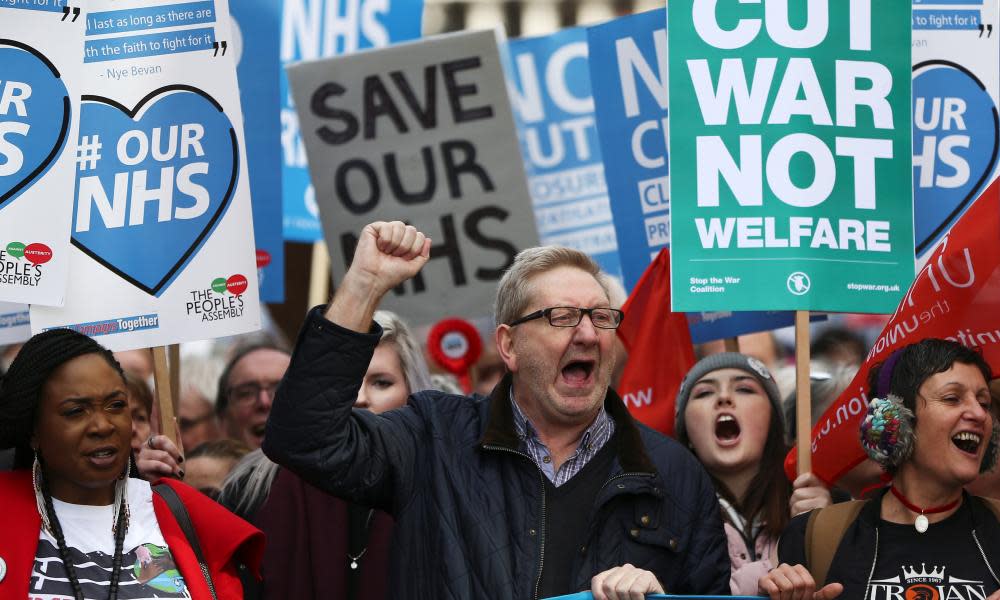Time for an honest conversation about trade unions | Letters

It was welcome to see space given to comment on the government’s so-called proposed industrial strategy (Built to last, 17 April) together with an article the same day on a TUC call for workers’ rights being central to Brexit. But Zoe Williams’ comment that “distribution of profit steadily shifting away from employees … is plainly because labour is failing to organise” (Opinion, 17 April) misses a crucial point.
Yes, of course it is the responsibility of unions to attempt to organise their members and indeed recruit new members, but without reference to the onslaught of anti-trade union legislation, particularly from 1992, you could be forgiven for thinking that unions have been turning a blind eye to the ever present problems of growing inequality in UK society. The shackles placed on trade unions, and thereby ordinary workers, cannot be underestimated in the reduced ability to collectively bargain for members. It is not merely a “feedback loop”.
A shift away from collective rights in the past 25 years has made it harder and harder for trade unions to organise and represent workers. In 1998, the Labour prime minister, Tony Blair, in his foreword to Fairness at Work, the white paper that was to become the Employment Relations Act of 1999, was happy to boast of denying workers decent employment rights when he stated that even with the “changes we propose, Britain will have the most lightly regulated labour market of any leading economy in the world”.
Cathy Cross
London
• It’s great to see someone weighing into the union bureaucracy issue, but Zoe Williams presents “unions” as solid, one-dimensional structures. Instead, as I and others have pointed out, there are two aspects to these organisations – movement-based and institutional. The inspirational uprising of dock labourers which led to the founding of the TGWU (later Unite) was as “spontaneous” and unpredictable as any romantic could ask for; yet there were activists like Tom Mann, Will Thorne and Ben Tillett who had been working for years behind the scenes to organise just such workers.
Sheila Cohen
London
• Zoe Williams advises that “unions don’t have to limit themselves to the labour force”. Under Len McCluskey’s leadership, Unite set up community sections for people not in the workplace eg retired and disabled people, students etc. My Southampton Unite community branch has members from a wide range of backgrounds who not only support the main Unite union in its fight against exploitative employers, eg Sports Direct, but also campaign tirelessly at local level to protect public services and workers’ rights.
We liaise with other groups opposing NHS privatisation, benefit sanctions and austerity policies. Over recent months we’ve campaigned with teachers, junior doctors, anti-racists, disabled and LGBT organisations. The community is frequently “on the same side” as the workers because the “workers” are also part of the community.
Karen Barratt
Winchester, Hampshire
• Our elections for the general secretary position and the positions on our executive council are being held simultaneously because this saves the union £1m of members’ money. It has nothing to do with anyone’s retirement dates – mandatory retirement at a particular age was outlawed years ago.
Our electorate is made up of members who pay membership dues. It therefore excludes those more than 13 weeks in arrears and retired members who hold free cards, as well as a small number of members for whom we hold incomplete addresses.
The ballot has been open for more than three weeks now, and so the bank holiday is not the obstacle Ms Williams presents, any more than when the last general secretary election period also included the Easter break.
As for low turnout, this is a real problem which could be addressed by a shift to secure workplace balloting, freed from the Tories’ insistence that we must use the costly and archaic postal vote system.
Gail Cartmail
Acting general secretary, Unite the union
• I’ve been active in the trade union movement since the 1970s. Over those 40 years, unions have consistently been portrayed as old-fashioned and clueless. Mud sticks, and over time this has become a perverse common sense, a truth that isn’t true but that everyone thinks they know. And the imaginative things that trade unions do – on training, skills, reaching out to young workers, to casual and insecure workers – don’t get attention because they don’t fit the story that everyone thinks they know.
If progressive journalists want to support the trade union movement, how about starting from the assumption that unions are a good thing, and that they do good things, and go from there?
Martin Spence
London
• Join the debate – email guardian.letters@theguardian.com
• Read more Guardian letters – click here to visit gu.com/letters

 Yahoo News
Yahoo News 
